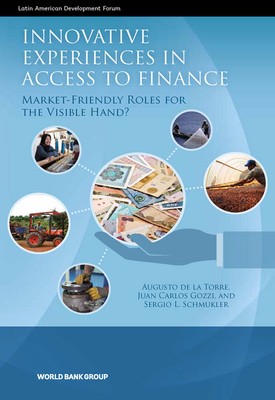
- We will send in 10–14 business days.
- Author: Augusto de la Torre
- Publisher: World Bank Publications
- ISBN-10: 0821370804
- ISBN-13: 9780821370803
- Format: 15.2 x 22.9 x 1.6 cm, minkšti viršeliai
- Language: English
- SAVE -10% with code: EXTRA
Reviews
Description
Interest in access to finance and awareness of its importance have increased significantly since the early 2000s. Growing evidence suggests that lack of access to credit prevents many households and firms from financing high-return investment projects, which has an adverse effect on growth and poverty alleviation. Despite the increasing awareness of the importance of access to finance among both researchers and policymakers, there are still some major gaps in our understanding of the main drivers of access, as well as about the impact of different policies in this area. This book aims to fill some of these gaps by discussing recent innovative experiences in broadening access to credit in Latin America. These experiences are consistent with an emerging new view that, while recognizing the central role of the public sector in improving the contractual and informational environment for financial markets, also contends that there might be room for well-designed, restricted interventions in collaboration with the private sector to foster the development of financial markets and broaden access to them. In particular, the book analyzes, among other things, some interesting experiences from Brazil, Chile, Colombia, and Mexico that use different instruments to broaden access to credit in a sustainable way, such as structured finance, factoring, credit guarantees, and correspondent banking. Most of these experiences have led to financial innovation by developing new financial products and coordinating different players in the financial and real sectors to overcome barriers to access to credit. The book provides a first systematic analysis of these innovative experiences, including an analytical framework to understand problems of access to finance and a discussion of the effects and optimal design of public interventions. Finally, the book discusses some open policy questions about the role of the private and public sectors (including state‐owned banks) in broadening access to finance in a sustainable and market-friendly manner.
EXTRA 10 % discount with code: EXTRA
The promotion ends in 22d.04:30:10
The discount code is valid when purchasing from 10 €. Discounts do not stack.
- Author: Augusto de la Torre
- Publisher: World Bank Publications
- ISBN-10: 0821370804
- ISBN-13: 9780821370803
- Format: 15.2 x 22.9 x 1.6 cm, minkšti viršeliai
- Language: English English
Interest in access to finance and awareness of its importance have increased significantly since the early 2000s. Growing evidence suggests that lack of access to credit prevents many households and firms from financing high-return investment projects, which has an adverse effect on growth and poverty alleviation. Despite the increasing awareness of the importance of access to finance among both researchers and policymakers, there are still some major gaps in our understanding of the main drivers of access, as well as about the impact of different policies in this area. This book aims to fill some of these gaps by discussing recent innovative experiences in broadening access to credit in Latin America. These experiences are consistent with an emerging new view that, while recognizing the central role of the public sector in improving the contractual and informational environment for financial markets, also contends that there might be room for well-designed, restricted interventions in collaboration with the private sector to foster the development of financial markets and broaden access to them. In particular, the book analyzes, among other things, some interesting experiences from Brazil, Chile, Colombia, and Mexico that use different instruments to broaden access to credit in a sustainable way, such as structured finance, factoring, credit guarantees, and correspondent banking. Most of these experiences have led to financial innovation by developing new financial products and coordinating different players in the financial and real sectors to overcome barriers to access to credit. The book provides a first systematic analysis of these innovative experiences, including an analytical framework to understand problems of access to finance and a discussion of the effects and optimal design of public interventions. Finally, the book discusses some open policy questions about the role of the private and public sectors (including state‐owned banks) in broadening access to finance in a sustainable and market-friendly manner.


Reviews